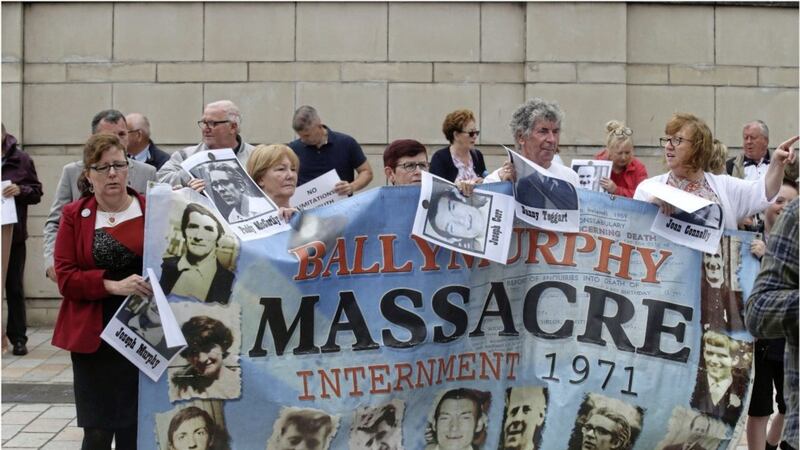THREE weeks from now the public consultation into dealing with legacy issues will close and given the absence of devolution it is likely that the ‘solution’ to 20 years of failure will be imposed from Westminster.
The four-strand mechanism process has been called Eames/Bradley for slow learners, a reference to the 2009 report by the Consultative Group on the Past by Lord Eames and Denis Bradley. At the time the report was criticised for a recommendation of financial compensation to all Troubles victims, regardless of how your loved one died. That broad definition of a victim remains the weeping wound that is likely to derail any and all attempts to deal with these issues in a timely manner.
This week BBC Spotlight journalist Stephen Dempster quizzed former chief constable Sir Hugh Orde on his views on legacy.
During his tenure as chief constable Sir Hugh established the Historical Enquiries Team, which was the first real attempt to give answers to forgotten victims. Not human rights-compliant and with a raft of other problems, the HET was indeed a flawed process. However, I maintain as a journalist who reported on many of the cold-case team’s findings that the officers approached the task with good intentions and in the main carried out a remarkable and impressive body of work.
But it was a sticking-plaster approach, a short-term solution to a very long-term and complicated problem.
Sir Hugh said: “I think where the government needs to be careful is to think it’s all over. Endgames in terrorism are messy.
“They don’t just stop and if people take their eye off the ball, if there’s a vacuum, those that want to bring the Troubles back have an opportunity.”
We’re not at a place where the Troubles could return but we are at a very perilous junction in the long-term peace project.
Recently documentaries, investigations and powerful storytelling have seen people take the issue of dealing with Troubles legacy into their own hands.
Families such as those who lost loved ones in Ballymurphy have in effect been forced to investigate their own relatives’ killings, to piece together evidence and witness testimony, to pore over autopsy reports and once confidential government documents, to appeal and campaign along with legacy solicitors and victims’ groups for fresh inquests when no other mechanisms were provided to them.
We all know that regardless of how good a job those relatives, their legal representatives, documentary makers and investigative journalists do in helping to shine a light in dark corners, it is no substitute for a properly constituted response involving the two governments.
The legacy proposals put out for consultation are imperfect and arguably unworkable but the bones of a solution are there.
Judicial, criminal outcomes become more remote as time passes. Acknowledgment, apologies and truth – as much as you can find truth in such situations – may well be all that remains.
But there is a very large elephant in the room. Loyalism has not been prepared or properly consulted or represented at any stage.
The patronising way that many nationalists and even other unionists refer to a large section of our society reminds me of how I felt when journalists with plummy English accents and no understanding of our lives reported during the conflict, demonising my community.
Nationalists are in a different place 20 years after the Good Friday Agreement. Progress has not been quick enough socially and economically but in terms of confidence the recent success of Féile an Phobail showcased a community that is advancing at a pace.
Last week I chaired a panel talk on legacy in the Constitutional Club in east Belfast, better known as the Con Club, an unashamedly loyalist establishment and the panel organised by Unionist Voice was unapologetically loyalist and unionist.
Apart from me, of course, and I will admit it was at times hot and heavy but I was glad I attended.
However, I was dismayed at the reaction to the event online, both towards me for attending but also because the panel was all unionist as though unionism doesn’t have the right to internally reflect on itself.
I was also shocked at the anger, the really raw and visceral anger, at what they see as an uneven approach to legacy investigations. It does not matter whether this is backed up by figures or a matter of perception. It is how people feel and to dismiss that is not only cruel. It is dangerous for long-term stability.
Unionist politicians have failed working-class loyalism. They really have. I have seen it with my own eyes, heard the pain and frustration with my own ears.
Pointing to progressive unionists and saying ‘be more like them’ is insulting to those who lost not just their loved ones but are frustrated at the place they now find themselves in, a place that they have not been supported or prepared to deal with.
Years of project-fear unionism have created a frightened, angry and distrustful community and you know what? I understand it and shame on all those who have left people behind or used them in the pursuit of political power.








